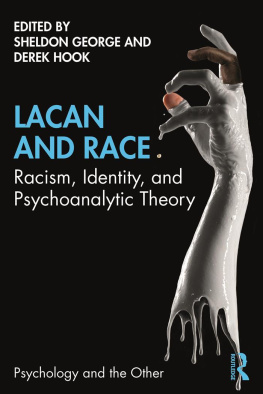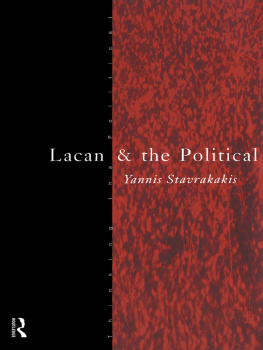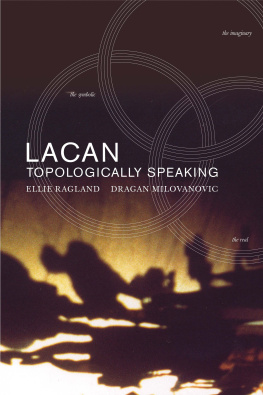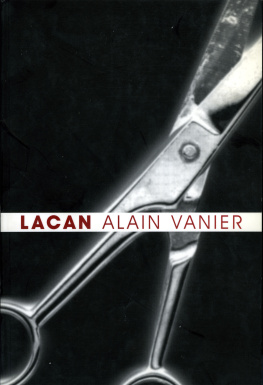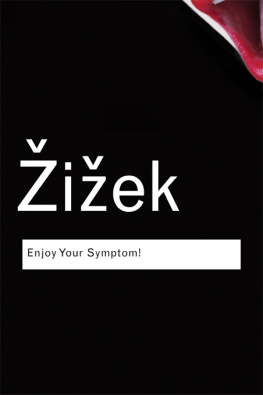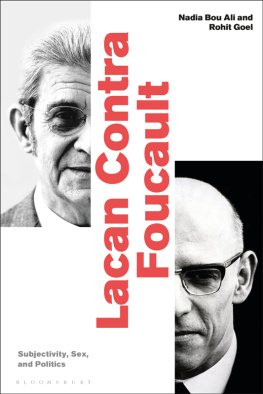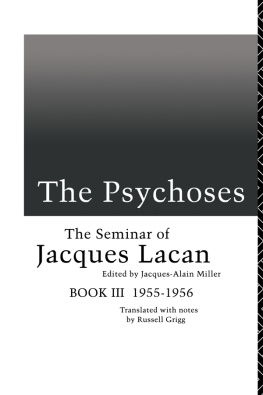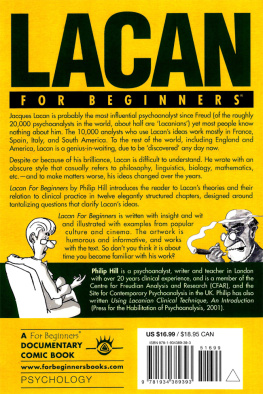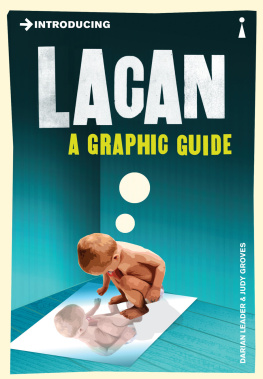Shepherdson Charles - Lacan and the Limits of Language
Here you can read online Shepherdson Charles - Lacan and the Limits of Language full text of the book (entire story) in english for free. Download pdf and epub, get meaning, cover and reviews about this ebook. year: 2008, publisher: Fordham University Press, genre: Romance novel. Description of the work, (preface) as well as reviews are available. Best literature library LitArk.com created for fans of good reading and offers a wide selection of genres:
Romance novel
Science fiction
Adventure
Detective
Science
History
Home and family
Prose
Art
Politics
Computer
Non-fiction
Religion
Business
Children
Humor
Choose a favorite category and find really read worthwhile books. Enjoy immersion in the world of imagination, feel the emotions of the characters or learn something new for yourself, make an fascinating discovery.

- Book:Lacan and the Limits of Language
- Author:
- Publisher:Fordham University Press
- Genre:
- Year:2008
- Rating:4 / 5
- Favourites:Add to favourites
- Your mark:
- 80
- 1
- 2
- 3
- 4
- 5
Lacan and the Limits of Language: summary, description and annotation
We offer to read an annotation, description, summary or preface (depends on what the author of the book "Lacan and the Limits of Language" wrote himself). If you haven't found the necessary information about the book — write in the comments, we will try to find it.
Lacan and the Limits of Language — read online for free the complete book (whole text) full work
Below is the text of the book, divided by pages. System saving the place of the last page read, allows you to conveniently read the book "Lacan and the Limits of Language" online for free, without having to search again every time where you left off. Put a bookmark, and you can go to the page where you finished reading at any time.
Font size:
Interval:
Bookmark:
LACAN AND THE LIMITS
OF LANGUAGE
CHARLES SHEPHERDSON

Copyright 2008 Fordham University Press
All rights reserved. No part of this publication may be reproduced, stored in a retrieval system, or transmitted in any form or by any meanselectronic, mechanical, photocopy, recording, or any otherexcept for brief quotations in printed reviews, without the prior permission of the publisher.
Library of Congress Cataloging-in-Publication Data
[[Data to come]]
Printed in the United States of America
10 09 08 5 4 3 2 1
First edition
E | Jacques Lacan. crits (Paris: Seuil, 1966). A portion of this volume has been translated as crits: A Selection, trans. Alan Sheridan (New York: Norton, 1977). References will be to the English edition. |
FS | Feminine Sexuality: Jacques Lacan and the cole Freudienne. Ed. Juliet Mitchell and Jacqueline Rose. Trans. Jacqueline Rose. New York: Norton, 1985. |
SI | Jacques Lacan.The Seminar of Jacques Lacan, Book I: Freuds Papers on Technique, 195354. Ed. Jacques-Alain Miller. Trans. John Forrester. New York: Norton, 1988. |
SII | Jacques Lacan. The Seminar of Jacques Lacan, Book II: The Ego in Freuds Theory and in the Technique of Psychoanalysis, 195455. Ed. Jacques-Alain Miller. Trans. Sylvana Tomaselli. New York: Norton, 1988. |
SVII | Jacques Lacan. The Seminar of Jacques Lacan, Book VII: The Ethics of Psychoanalysis 195960. Ed. Jacques-Alain Miller. Trans. Dennis Porter. New York: Norton, 1992. |
SVIII | Jacques Lacan. Le Seminaire, livre VIII: Le transfert. Ed. Jacques-Alain Miller. Paris: Seuil, 1991. |
SXI | Jacques Lacan. The Four Fundamental Concepts of Psychoanalysis. Trans. Alan Sheridan. New York: Norton, 1978. |
SE | Sigmund Freud. The Standard Edition of the Complete Psychological Works. Trans. and ed. James Strachey et. al. London: The Hogarth Press, 1953. 24 volumes. |
T | Jacques Lacan. Television, trans. Denis Hollier, Rosalind Krauss, and Annette Michelson. In Television: A Challenge to the Psychoanalytic Establishment, ed. Joan Copjec (New York: Norton, 1990). |
TL | Julia Kristeva. Tales of Love. Trans. Leon Roudiez. New York: Columbia University Press, 1987. |
These chapters were written as occasional essays, each at the invitation of a different host, who invited me to think about a topic of his or her own choosing. The solicitation of thought that is thereby implied, the way in which my own thought, grounded in philosophy and psychoanalysis, was shaped and altered by these invitations, is of intrinsic interest to me, insofar as it suggests how thought, and indeed life itself, unfolds beyond the individual, and beyond ones own preoccupations. At the same time, my own concerns invariably mark each essay. And above all I am struck, looking back at these essays, at how preoccupied I have been with trying to support a conversation across boundaries that have become overly territorialized, overly defended, and exclusive. These boundaries are multiple, and I attempt here to cross them in several ways simultaneously. Several chapters are concerned with the question of the body, which Lacan is often wrongly said to neglect ().
In general, these crossings between Lacan and other thinkers (feminist theory, Foucault, Derrida, and Heidegger, especially) are subterranean here, in the sense that these relationships are not the topic of the essays. But readers will see very clearly, I think, where I am inviting these relationships, and indeed am compelled to initiate them, for what I hope are more authentic reasonsnot, in other words, because I sought to produce an academic essay on Lacans relation to Derrida (useful as this could be), but rather because a particular conceptual issue, set before me by others, led me to realize that the issue itselfdie Sache selbstcalled me to encounter the question of these relations. Thus, even while the relationships named above (to a thinker like Derrida, or a concept like affect) remain subterranean, I think they will be the recognizable substructure of this book, and that readers will see how the issues themselves should oblige usand I do see this as an ethical issue, especially today, when so many territorialized camps have been set up in the academy, such that Foucauldians do not read Lacan, philosophers do not touch psychoanalysis (and I use touch with all its phobic resonance), with the forceful and important exception of feminist theory, and Lacanians, unfortunately, do not read anyone else, except to demonstrate that so-and-so only repeats what Lacan already said more profoundly, or fails to recognize the most crucial point, which only Lacan was able to see for usto move across these territorial boundaries, which are only the trivial boundaries of academic turf, and not appropriate to the conceptual work that calls for our attention. Derrida and Lacan, Foucault and Lacan, have much closer and more intimate relations than their reception has allowed, and academic pieties and allegiances, indeed, kinship wars (inheritances of the father), have largely prevented us from engaging these relationships in a serious way. This is not to say that there are no serious differences between these think-erson the contrary. But we will never grasp them with any clarity if we begin, and teach our students to begin, with denunciations, excommunications, and imaginary rivalry. Too often, especially in our academic culture, and in the training of our doctoral students, these allegiances have taken the place of thinking, and I hope these essays will encourage some more generous and hospitable encounters.
Let me be somewhat more concrete. emerged from some questions posed to me by a Mexican student of psychoanalysis, who was trying to understand the concept of the real and who asked me to clarify its relation to the symbolic order. I therefore wrote this piece in a very schematic way, somewhat like an encyclopedia article, hoping at least to sketch out some of the major issues that the concept of the real might engage, and also to suggest some general points of intersection between the real in Lacan and other contemporary issues or thinkersthe trace in Derrida, the incest prohibition in Lvi-Strauss, the critique of Lacans covert essentialism that one finds in some of Judith Butlers work.
was written at the invitation of Joan Copjec, for a splendid conference on Antigone at the University at Buffalo, and since this community included some people in comparative literature whom I greatly admire (Rodolphe Gasch, Carol Jacobs, Henry Sussman, and others), I tried to emphasize not only the argument of Lacans Ethics of Psychoanalysis but also (1) the literary text itself, (2) Hegels famous interpretation of Sophocles, and (3) some classical issues stemming from Aristotles Poetics, particularly insofar as they bear on catharsis, and the problem of jouissance.
, where I also turn briefly from Antigone to Hamlet for guidance.
worse) on Ovid, I was pulled irrevocably back to my own origins in literary study, and I found that the text of Ovid, understood not as an example or instance of psychoanalysis but as a dense literary object, inserted into its own complex literary tradition, compelled me to read
Next pageFont size:
Interval:
Bookmark:
Similar books «Lacan and the Limits of Language»
Look at similar books to Lacan and the Limits of Language. We have selected literature similar in name and meaning in the hope of providing readers with more options to find new, interesting, not yet read works.
Discussion, reviews of the book Lacan and the Limits of Language and just readers' own opinions. Leave your comments, write what you think about the work, its meaning or the main characters. Specify what exactly you liked and what you didn't like, and why you think so.

